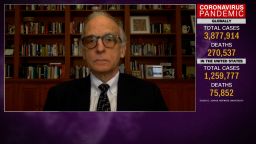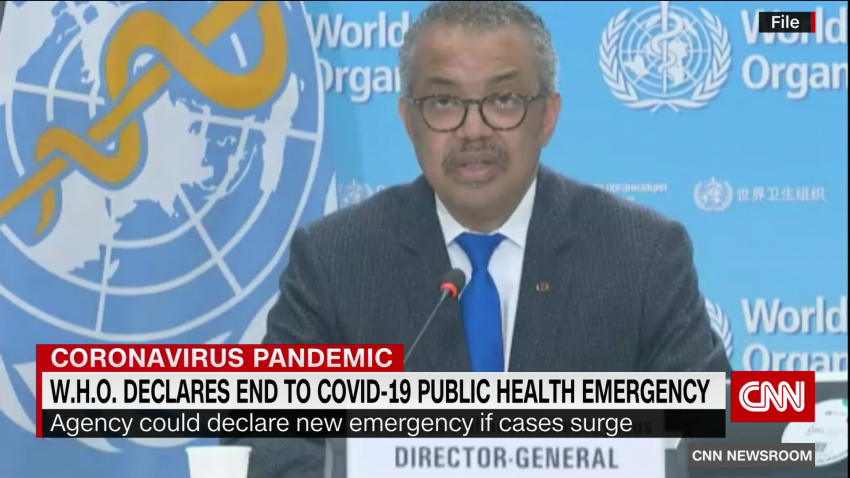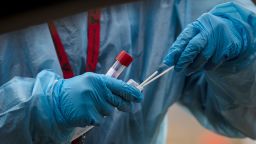Editor’s note: Kent Sepkowitz is a physician and infectious disease expert at Memorial Sloan Kettering Cancer Center in New York. The views expressed in this commentary are his own. View more opinion on CNN.
At long last, the Covid-19 pandemic has entered its whimper phase. Last week, the World Health Organization decided to end the Covid-19 global health emergency. The US public health emergency is scheduled to end on Thursday, and beginning the following day, vaccination against Covid-19 will no longer be required for non-US travelers entering the States.

These pandemic milestones come after three demoralizing years of disease spikes, then quiet periods, then more spikes, eventually causing 1.1 million deaths in the United States and almost 7 million worldwide.
The slow and steady, data-based rollback of these previously necessary interventions surely is the right thing to do — as is assuring that masks and vaccines and test kits (though these soon will no longer be free to all) and the entire apparatus of pandemic control remain available for those who feel uneasy still.
Despite what the evidence says, I admit that I am nervous that we might be lightening things up too quickly. I do have a rational reason for my irrational stance. Infectious diseases don’t ever really go away; they just change a little, then change some more till one day, they return bigger and fiercer than ever.
Covid-19, the spawn of the simple coronavirus, is of course the most vivid example, but influenza, respiratory syncytial virus and various similar “colds” have always had good seasons and bad as their DNA is shuffled and re-sorted and new viral tricks are learned.
As an infectious disease specialist, I have long accepted that we humans are on borrowed time; the microbes outnumber us by the trillions and have no emotional attachments, no hesitation or doubt, and no goal other than to be fruitful and multiply.
Plus, the history of infectious diseases is rife with infections that came within a hair of eradication, only to return, sometimes with a vengeance, and other times with a dogged persistence similar to what we now see with SARS-CoV-2.
Legendary scourges such as polio and measles patiently crowd the gate, waiting for us to vaccinate incompletely or not at all, standing at the ready to rekindle new waves of infectious diseases that appropriate respect for public health might have prevented.
So, though the easing up of Covid-19 restrictions is warranted for May 2023, this cannot be viewed as a permanent “Party on, Wayne!” sort of moment. There will be more trouble from the relentless coronavirus and/or other viruses in the months, years or decades ahead. Practical considerations (aka living a normal life), though, right now supersede the baseline worry of professionals; we simply can’t cower as we wait for another shoe to drop.
And the specifics of the next bad thing — another coronavirus or RSV or influenza or a less famous infection that goes rogue —is not what keeps us infectious disease specialists up at night. Rather, it is the deepening uncertainty as to whether the US will be able to respond to the next crisis.
The loose collection of anti-vaxxers, anti-pharma, anti-science, pro-conspiracists has hardened into a movement. US Rep. Lauren Boebert of Colorado said recently, on the resignation of US Centers for Disease Control and Prevention Director Dr. Rochelle Walensky, “Rochelle was a major player in the lockdowns, jab mandates and the economic destruction of America,” as if her view of malfeasance were accepted fact.
Of course, Walensky became the CDC’s chief 10 months after the lockdown first began, and the CDC doesn’t have the power to require vaccines for people in the US.
In a letter to President Joe Biden, Walensky said that she took the job at his request “with the goal of leaving behind the dark days of the pandemic and moving CDC — and public health — forward into a much better and more trusted place.” She noted, too, that the CDC “saved and improved lives and protected the country and the world from the greatest infectious disease threat we have seen in over 100 years.”
More ominously, among the anti-vaccine crowd there’s one particular well-funded group, whose leader, according to NPR’s Lisa Hagen, views the doings of the last years as a “pandemic-driven plot to poison the world for profit.” The group is organizing itself both to spread its ideology and also to develop a fleet of lawyers content to turn public health considerations into another Jarndyce v. Jarndyce lawsuit, grinding scientific progress to a halt. Its enemy is not the disease itself but rather the necessary steps taken by public health and scientific leaders to save human lives.
Which means that at the next public health crisis we will need to deal not only with a pathogen but also with a well-organized, non-reality-based community that seems tireless in its pursuit of alternative facts. Though the majority of people in the US are vaccinated, seem to believe in science and simply want to go about their business, the noisy minority will likely make the Trump-organized Operation Warp Speed response to the Covid-19 pandemic seem like a once-in-a-lifetime moment of amity, a peaceful agreement across all ideologies and political stripes.
And that is a situation that should keep a lot of us up at night.






